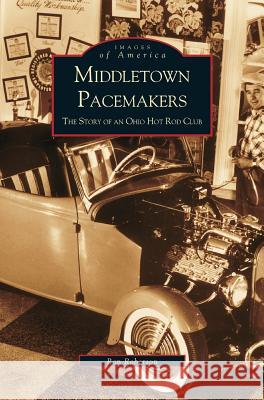Middletown Pacemakers: The Story of an Ohio Hot Rod Club » książka
Middletown Pacemakers: The Story of an Ohio Hot Rod Club
ISBN-13: 9781531613273 / Angielski / Twarda / 2002 / 162 str.
Hot Rodding began in Southern California in the 1930s and had spread throughout the United States by the mid 1950s, spawning the sport of drag racing and the advent of the Detroit "muscle cars" of the '60s and '70s. Hot Rod Magazine and the National Hot Rod Association promoted the formation of responsible car clubs to combat the delinquent reputation of hot rodders, earned through illegal street races and Hollywood's portrayal in "B" movies. And thus were born the Middletown Pacemakers in 1951.The Pacemakers brought southern Ohio its first reliability runs (1952), custom auto shows (1954), and drag racing competitions-setting national records (1958, '63, '64) and winning national championships (1963, '64, '65). When the hot rodders were not busy upgrading their drive train for more horsepower or "chopping" and "channeling" for improved performance, they could often be seen on the streets of Middletown feeding expired parking meters or rescuing motorists whose cars had broken down or run out of gas. By 1966, as was the fate of so many hot rod clubs, the mass production of Detroit muscle cars ushered the Pacemakers to fold.
Hot Rodding began in Southern California in the 1930s and had spread throughout the United States by the mid 1950s, spawning the sport of drag racing and the advent of the Detroit "muscle cars" of the 60s and 70s. Hot Rod Magazine and the National Hot Rod Association promoted the formation of responsible car clubs to combat the delinquent reputation of hot rodders, earned through illegal street races and Hollywoods portrayal in "B" movies. And thus were born the Middletown Pacemakers in 1951.
The Pacemakers brought southern Ohio its first reliability runs (1952), custom auto shows (1954), and drag racing competitions-setting national records (1958, 63, 64) and winning national championships (1963, 64, 65). When the hot rodders were not busy upgrading their drive train for more horsepower or "chopping" and "channeling" for improved performance, they could often be seen on the streets of Middletown feeding expired parking meters or rescuing motorists whose cars had broken down or run out of gas. By 1966, as was the fate of so many hot rod clubs, the mass production of Detroit muscle cars ushered the Pacemakers to fold.











